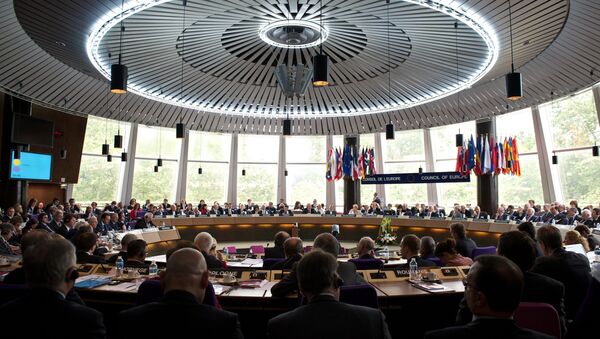There is always going to be a gap between people’s understanding of what is just/unjust and formal court rulings. Law will always strive to catch up with changing societal attitudes to “justice” and “injustice.” But law will always more or less miserably fall behind, unless some “progressive” minds decide to use the law for forming (or deforming?) societal attitudes. Then the gap is supposed to drag society in the “progressive” direction – for example, excusing euthanasia or some other controversial practice. But there are certain situations when this gap becomes just too dangerously wide.
Famous & Infamous
Examples of this situation were very plentiful in the latest rulings of European courts on various situations involving Russia’s “political celebrities” (people famous in the eyes of a “liberal” minority, but mostly infamous in the eyes of Russia’s more traditionalist majority). The European Court on Human Rights (ECHR) ruled that Boris Nemtsov, former first vice-premier in Boris Yeltsin's notoriously corrupt 1990s government, should get from the Russian state budget 26 thousand (26,000) euros for spending 15 days in detention for organizing an unwarranted rally on December 31, 2010. Mr. Nemtsov was then arrested with another “enfant terrible” of Russia’s opposition movement, Eduard Limonov, because their supporters jostled with police. Limonov, a leftist, later remembered that “the former vice-premier looked most out of place in jail with his Mediterranean suntan and other perks of long past glory and power.”
Appetite comes with the meals, as the French say. So, the former members of the Pussy Riot band, who insulted the Patriarch of the Russian Orthodox Church calling him a “bitch” during their so called punk performance in Russia’s main Orthodox cathedral in February 2012, lodged a lawsuit at the aforementioned ECHR, seeking to recover 250,000 euros in damages for spending more than a year in jail on charges of hooliganism. (Both members, Maria Alekhina and Nadezhda Tolokonnikova, were amnestied by president Putin in the end of 2013 and went free on the eve of Sochi Olympic Games.)
For an average Russian 26,000 euros (not to speak of 250,000 euros) is a huge amount of money, which is certainly more deserved by some other members of Russian society, be it in compensation or in a simple reward for work. But the ECHR is more interested in Mr. Nemtsov or the naughty members of Pussy Riot’s “parent group” Voina (War), (in)famous for drawing a giant phallus on a rising “wing” of a St. Petersburg’s bridge. Few people in Russia would agree with such hefty compensations for hooligans, thus widening the gap between a European court and Russian public opinion.
Triple Rewards for Double Chins
But the gap to beat all gaps was created by the recent decision of the Hague Tribunal, which awarded $50 billion to the former shareholders of the now defunct oil company Yukos, until 2003 Russia’s richest legal entity. The decision concerns Yukos 1, the case in which Yukos and its largest shareholder and CEO Mikhail Khodorkovsky were found guilty of tax fraud.
Let’s put aside the personalities here: of course, the Russian public has little sympathy for these guys “with double chins and triple citizenships,” who made up the bulk of Yukos’s owners. And of course, you would find little enthusiasm in Russia about paying these people the ludicrous (in fact, unprecedented in world history) sum in damages. But let’s put it all aside and concentrate on the question: was the Dutch court acting within the framework of its jurisdiction, when it decided the fate of $50 billion of Russia’s budget money?
The Hague tribunal decided in 2009 that it could consider the case because Russia in 1994 had signed the European Energy Charter even though tax law is traditionally strictly a subject for national courts.
The Legal Side
Russia did sign the Energy Charter in 1994 but never ratified it. Russia has repeatedly said it has no intention of ratifying it. Impressive legal scholars (not all Russian) told the Hague Tribunal the unratified Energy Charter does not apply to Russia and is contrary to the Russian Constitution and to Russian law. The Hague tribunal nonetheless decided the Energy Charter "provisionally applied”. This makes no sense. It implies Russia is eternally bound by the Energy Charter even though it has not ratified it — an astonishing claim for a tribunal to make.
The Hague tribunal then retried the case as if it was a Russian court. Since the Hague tribunal is not a Russian court and since the issue is the purely Russian one of Yukos's liability in Russian law for evasion of Russian taxes the Hague tribunal had no right to do this. Period.
No Sham
The Hague tribunal then decided the case on the assumption – rejected by the European Court of Human Rights(the court set up by international Treaty to decide the question) — that the case against Yukos was politically motivated. It uncritically accepted the evidence of witnesses requested by Khodorkovsky and Yukos’s vice-president Leonid Nevzlin, even though it actually accepted Russia's case that Yukos arranged its tax affairs in a way that broke Russian law. It is impossible to avoid a sense of a mind made up which interprets everything according to its pre-formed view that Russia is guilty. The bias is obvious and informs everything in the decision.
This contrasts with the approach of the ECHR which decided in a succession of judgments that questions of Russian tax law are for Russian courts to decide, that despite some serious procedural errors the Russian courts decided Yukos 1 fairly, that Yukos 1 is no sham and was not a politically motivated case and that on the evidence that Khodorkovsky and Yukos were properly convicted by the Russian courts of massive tax fraud. Because of the procedural errors the ECHR recently awarded the Yukos shareholders 1.86 billion euros – a fraction of the ridiculous amount of $50 billion awarded to the shareholders by the Hague tribunal though even the amount of 1.86 billion euros is too high and Russia has said it will appeal it.
The Hague tribunal because of its bias retried the whole case. The ECHR looked to see whether the Russians courts decided the case properly. The approach of the ECHR is the right one. The Hague tribunal’s approach is crudely biased and wrong. Russia is right to appeal its decision and (if it remains in force) to ignore it.
Eyes for East, Ear for West
…So, this is the legal side of the problem. But the “un-political” nature of the European courts is a myth only the EU officials believe – and only on paper. It is enough to point out that ECHR shows remarkable clemency to the EU- and US-friendly governments. For example, few experts expect the ECHR to rule on the Ukrainian government’s bombings of its own country’s restive eastern regions, even though these bombings caused their victims much greater pain than the one Leonid Nevzlin had to endure fleeing to Israel from a trial for arranging contract murders in his native Russia in the 1990s. And of course, everyone forgot about the lawsuits against NATO’s bombings of Yugoslavia. Only with Russia do the European courts proceed slowly but steadily – having their verdicts ripen exactly at the moment of political tensions between Russia and the West.


